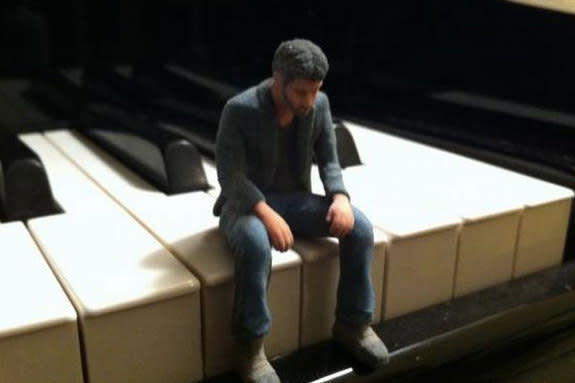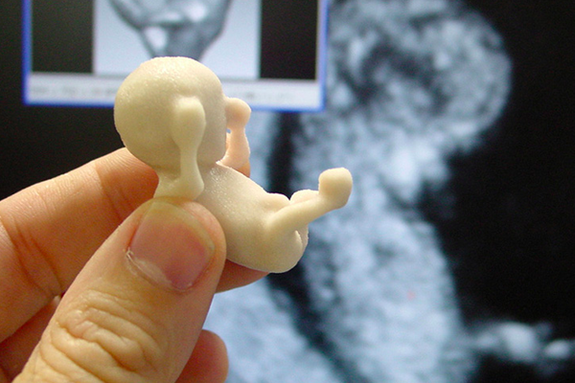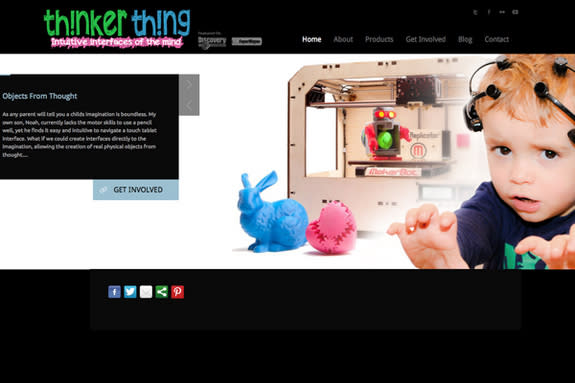10 Amazing 3D-Printing Startups
Whether they're designing hyper-modern light fixtures or reproducing human tissues, startups all over the world are using 3D printing as a foundation for building innovative businesses.
3D printing allows startups to create fast, affordable prototypes to attract investors and set ideas in motion. And due to the highly-customizable nature of 3D printed objects, this new manufacturing process is revolutionizing the way that businesses interact with their customers.
Here are 10 startups putting 3D printing to work:
Shapeways
Founded in 2007, Shapeways is a virtual 3D printing marketplace for making, buying and selling 3D-printed creations. Shop owners- or anyone else with a 3D-printable idea- can build a virtual model of their product and have it printed by Shapeways.
From sterling silver jewelry to the world's tiniest Rubik's cube, Shapeways has a host of beautiful- and weird- items for sale. When you order something from a shop, Shapeways prints it, ships it and compensates the shop owner.
This modern marketplace is popular with 3D enthusiasts all over the world and provides a great platform for designers that want to create innovative products or prototypes without spending all their money on manufacturing.
MakerBot
Arguably the trendiest name in 3D printing, Brooklyn-based MakerBot is a leading producers of desktop 3D printers. Anyone from engineers to hobbyists can purchase a MakerBot printer and get to work manufacturing their own creations. In fact, many of the other startups on this list put MakerBots to work in unique ways.
Founded in 2009, MakerBot is also a valuable resource for the 3D printing community. The company's Thingiverse site is home to hundreds of free project downloads, providing an open-source platform for sharing ideas and designs.
[7 Cool Uses of 3D Printing in Medicine ]
Pirate 3D
Another startup making waves in the 3D printing world is Pirate 3D, a Palo Alto-based company with dreams of bringing 3D printers into everyones' home office.
The company's Buccaneer desktop 3D printer, which has raised nearly $1 million on Kickstarter, can print wirelessly from Android and iOS devices and is allegedly very user-friendly.
The Buccaneer is also very wallet-friendly, with an anticipated sale price of about $350. That's a sixth of the price of MakerBot's most recent desktop model, the Replicator 2.
Eyes on the Future
There are several startups- some still looking for funding- that aim to bring fashion into the twenty-first century using 3D printing. These companies focus on mass manufacturing highly customizable products, like eyeglasses and iPhone cases, with 3D printing technology.
Make Eyewear is experimenting with 3D printed glasses. The company's frames are printed with a lightweight, flexible nylon that can be fitted with prescription or tinted lenses.
And Protos, another 3D eyewear startup, is currently developing a way to offer customers a simple way to design their own 3D-printable frames.
Spuni
No one has ever been accused of being born with a 3D-printed spoon in their mouth- until now. Spuni, the ergonomically designed baby spoon, was created by two MIT grads fed up with the mess that accompanies feeding a baby from a regular baby spoon.
In order to make their Spuni dreams come true, the product's creators used 3D printing to design and perfect a prototype that they could test on hungry babies.
Clearly the prototype worked well, because Spuni has since raised over $35,000 with its Indiegogo campaign and its first products are being shipped to customers this month.
Tecnologia Humana 3D
But parents don't have to wait until baby starts eating solid food to take advantage of 3D printing technology. Tecnologia Humana 3D, a Brazilian company specializing in customizable 3D-printed orthotics, offers expecting mothers and fathers a three dimensional look at their beloved fetus in utero.
That's right- a 3D-printed ultrasound. The Japanese company Fasotec offers a similar product for expecting parents at a pregnancy clinic in Tokyo. For just over $1,000, customers can take home a 3D printed, key-chain sized fetus of their very own.
Organovo
Based in San Diego, Organovo is a biotech startup focused on the development of 3D printed biological materials, particularly human tissues. Since the company's founding in 2007, it has pioneered research in 3D bioprinting, creating synthetic tissues that function just like real human tissues.
Materials printed at Organovo help researchers study diseases and allow them to test the effects of drugs on human tissue without putting anyone at risk. The company is also working on printing materials- like liver tissue- that can be used for medical implants or replacements.
How 3D Printers Could Reinvent NASA Space Food
The Dreambox
If you need something 3D-printed in a hurry, head to Dreambox. Developed by undergrads at the University of California Berkeley, Dreambox is a 3D printing vending machine that can create whatever object you tell it to in minutes.
The Dreambox is currently housed only on the UC Berkeley campus, but its developers have already received funding for their startup and are on their way toward making mobile 3D printing a reality for all.
Thinker Thing
Imagine if you could create an object just by thinking about it. Chilean-based startup Thinker Thing wants you to be able to do just that.
This innovative company aims to connect the latest neuro technological equipment- like brain-computer interfaces- with 3D printing technology. In other words, they're creating software that makes it possible for someone wearing an electroencephalography(EEG) headset to picture an object in his or her mind and have that object printed in 3D.
Freedom of Creation
Founded in 2000, Dutch design studio Freedom of Creation has long been a pioneer in the field of 3D printing. The company is best known for its innovative home furnishings and lighting fixtures, which have been featured everywhere from the Museum of Modern Art to Hilton hotels.
Freedom of Creation prides itself on being among the first wave of startups to use 3D printing as an affordable and highly customizable manufacturing option. The company already Nike, Nokia, Hyundai and L'Oreal among its clients.
This story was provided by BusinessNewsDaily, a sister site to LiveScience. Follow Elizabeth Palermo on Twitter @techEpalermo or BusinessNewsDaily @BNDarticles. We're also on Facebook & Google+. This story was originally published on BusinessNewsDaily.
Copyright 2013 LiveScience, a TechMediaNetwork company. All rights reserved. This material may not be published, broadcast, rewritten or redistributed.




